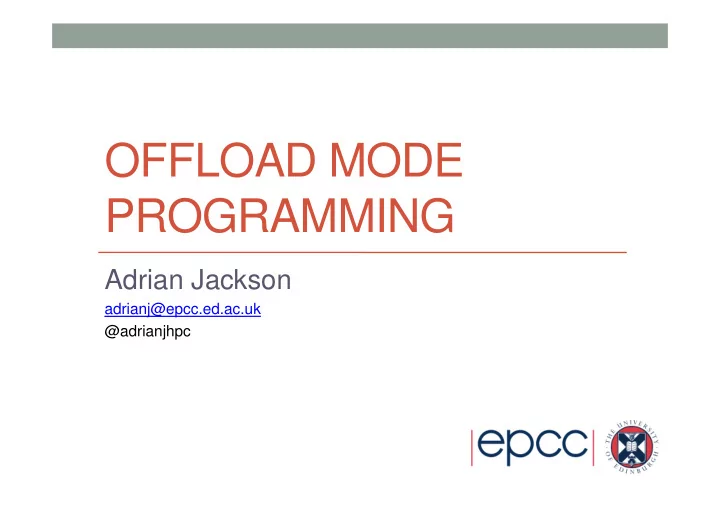

OFFLOAD MODE PROGRAMMING Adrian Jackson adrianj@epcc.ed.ac.uk @adrianjhpc
Overview • Offloading with Intel LEO • Data Movement in Intel LEO • Asynchronous Execution • Compiling and Running
Offloading model • Similar data model to GPGPU. • Kernels of work run on co-processors, main program on host • A program runs on the host and offloads work by specifying that the Xeon Phi executes a block of code • The host also directs the movement of data between the host and the co-processor • Data loaded on to the co-processor, and results copied off • Reduces user interaction with co-processor
Programming models • Three different ways offload can be programmed • Explicit • Implicit • Library • Explicit • Programmer explicitly directs data movement and code execution • This is achievable with Intel LEO, OpenMP 4.0, or with low level API • Implicit • Virtual shared memory provided by Cilk Plus • Programmer marks some data as shared • Runtime automatically synchronizes values between host and co- processor • Library • Some libraries have offload kernels implemented in them, i.e. Intel MKL • Library manages offloading and data movement internally.
Intel LEO • LEO – Language Extensions for Offload • Compiler can generate code for host and co-processors • LEO adds: • pragmas and keywords make sections run on the Xeon Phi • C/C++: #pragma offload target (mic [ : target - number] ) [ , clause...] {…} • Fortran: !dir$ offload target (mic [ : target - number] ) [ , clause...] … !dir$ end offload target-number: • Optional, can be used to specific a specific Xeon Phi
LEO offload attribute • Can mark entire function or global variable for offloading • Will compile/create for both host and co-processor • C/C++ __attribute__((target (mic))) int mydata; __attribute__((target (mic))) double myfunc (double* a, double* b) {...} • Fortran !dir$ attributes offload: mic :: mydata integer :: mydata !dir$ attributes offload: mic :: myfunc function myfunc(a,b)
Offloading blocks of code • Also possible to offload a whole section of code: #pragma offload_attribute(push, target(mic)) int gsize; double myfunc (double* a, double* b) {...} #pragma offload_attribute(pop) • Fortran: Only possible for variables !dir$ options /offload_attribute_target=mic integer :: mydata real :: rsize !dir$ end options
Data movement • Co-processor and host have different memory and memory spaces • LEO requires explicit data movement • Data movement directives • Offloading directives can also include information about data • Data clauses for offload directives • Copy from host to Xeon Phi in(var1 [,...]) • Copy from coprocessor to host. out(var1 [,...]) • Copy from host to coprocessor and back to host at end. inout(var1 [,...]) • Don't copy selected variables. nocopy(var1 [,...])
Movement examples • C: double data1[1000], data2[2000], data3[500], outputdata[2000] #pragma offload target(mic) in(data2), out(outputdata), inout(data1,data3) #pragma omp parallel for for(i=0;i<500;i++){ data1[i] = data2[i] + data3[i]; data3[i] = data1[i]*data1[i]; outputdata[i] = data1[i] + data3[i]; } • Fortran real, dimension(1000) :: data1 real, dimension(2000) :: data2 real, dimension(500) :: data3 real, dimension(2000) :: outputdata !dir$ offload target(mic) in(data2), out(outputdata), inout(data1,data3) !omp$ parallel do do i=1,500 data1(i) = data2(i) + data3(i) data3(i) = data1(i) * data1(i) outputdata(i) = data1(i) + data3(i) end do
Dynamic data • Dynamically allocated data needs to be managed on the Xeon Phi • Add additional clauses to in/out/inout: length(element-count-expr) • Copy N elements of the pointer's type alloc_if(condition) • Allocate memory to hold data referenced by pointer on co- processor if condition is true free_if(condition) • free memory used by pointer on co-processor if condition is true
Dynamic data examples • C: double *data1, *data2, *data3, *outputdata; data1 = (double *) malloc(1000*sizeof(double)); data2 = (double *) malloc(2000*sizeof(double)); data3 = (double *) malloc(500*sizeof(double)); outputdata = (double *) malloc(2000*sizeof(double)); #pragma offload target(mic) in(data2: length(2000) alloc_if(1) free_if(0)), out(outputdata: length(2000) alloc_if(1) free_if(1)), inout(data1: length(1000) alloc_if(1) free_if(1)), inout(data3: length(500) alloc_if(1) free_if(1)) • Fortran real, allocatable, dimension(:) :: data1, data2, data3, outputdata allocate(data1(1000)) allocate(data2(2000)) allocate(data3(500)) allocate(outputdata(2000)) !dir$ offload target(mic) in(data2: length(2000) alloc_if(1) free_if(0)), out(outputdata: length(2000) alloc_if(1) free_if(1)), inout(data1: length(1000) alloc_if(1) free_if(1)), inout(data3: length(500) alloc_if(1) free_if(1))
Data only transfer • Move data without code execution on co-processors • offload_transfer • Fortran !dir$ offload_transfer target(mic[:target-number]) [,clause…] • C/C++ #pragma offload_transfer target(mic[:target-number]) [,clause…]
Data only transfer example • Fortran: !dir$ offload_transfer target(mic:0) in(a:length(N) alloc_if(1) free_if(0)) nocopy(b:length(N) alloc_if(1) free_if(0)) • C: #pragma offload_transfer target(mic:0) in(a:length(N) alloc_if(1) free_if(0)) nocopy(b:length(N) alloc_if(1) free_if(0))
Asynchronous execution • Previous examples driven by host code • Host code blocking whilst accelerator executes • Asynchronous execution allows host to also execute whilst co-processor is working • if(stmt) • If stmt is true then code is executed on the co-processor, if not executed on the host • signal(tag) • Triggers asynchronous execution of offload section. • wait(tag) • Wait for previous asynchronous execution of data transfer to complete. Matches with tag in previous signal statement
Wait • Can do a wait by itself (without data transfer or code execution) • Fortran !dir$ offload_wait target(mic[:target- number]) wait(sig) • C/C++ #pragma offload_wait target(mic[:target- number]) wait(sig)
Offload modes: Offload and wait • Execute on co-processor, host waits work1(); #pragma offload target(mic) { work2(); } work3(); …
Offload modes: Concurrent • Execute on co-processor and host, same thing, different parts int sig=0; work1(); #pragma offload target(mic)\ signal(sig) { work2(); } work3(); #pragma offload_wait \ target(mic) wait(sig) …
Offload modes: Symmetric • Execute on co-processor and host, doing different things int sig=0; work1(); #pragma offload target(mic)\ signal(sig) { work2(N/4); } work2(3N/4); #pragma offload_wait \ target(mic) wait(sig) work3() …
Running offload • Compilation is same as normal code • No special flags or libraries needed • MPSS install is required • Running offload code uses environment variables export OFFLOAD_DEVICES=1 export MIC_ENV_PREFIX=MIC export MIC_KMP_AFFINITY=compact,granularity=fine export MIC_OMP_NUM_THREADS=236
Output and conditional compilation • Output is returned to host • fflush (C/C++) or flush (Fortran) may be required to get output to appear real time • Can use pre-defined pre-processor macros in code #ifdef __MIC__ #ifdef __INTEL_OFFLOAD__
Recommend
More recommend